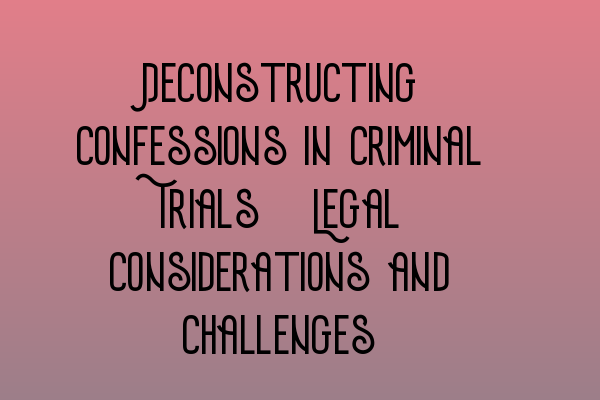Deconstructing Confessions in Criminal Trials: Legal Considerations and Challenges
Confessions play a crucial role in criminal trials, often serving as the centerpiece of the prosecution’s case. However, the validity and reliability of confessions can be subject to intense scrutiny and deconstruction. In this article, we will explore the legal considerations and challenges associated with deconstructing confessions in criminal trials.
The Importance of Confessions in Criminal Trials
Confessions are considered one of the most powerful pieces of evidence in a criminal trial. They provide direct admissions of guilt from the accused, simplifying the task of the prosecution and often leading to convictions. A well-presented confession can be compelling to a judge or jury, swaying their opinion and leading to a conviction beyond a reasonable doubt.
However, it is essential to approach confessions with caution and explore their reliability. False confessions can and do occur, often due to factors such as coercion, duress, or mental impairment. It is the duty of the defense to challenge these confessions and present evidence that raises doubts about their accuracy.
The Legal Considerations
When deconstructing confessions, several legal considerations must be taken into account:
- Voluntariness: The confession must have been given voluntarily, without any form of coercion or improper influence. If the defense can show that the confession was extracted through improper police conduct or duress, it can be challenged and potentially excluded as evidence.
- Miranda Warnings: In the UK, the caution given to an individual during the interview process is similar to the Miranda rights in the US. If the police failed to administer the caution properly, it could impact the admissibility of the confession.
- Mental Capacity: The mental state and capacity of the accused at the time of the confession are crucial factors. If the defense can prove that the accused was mentally impaired, coerced, or did not fully understand their rights, it can raise doubts about the reliability of the confession.
- Confessions of Co-defendants: If multiple defendants are involved in a case, their confessions can be cross-examined and challenged. Inconsistencies between co-defendants’ confessions can raise doubts about their accuracy.
It is important for defense solicitors to conduct a thorough analysis of the confession, examining the circumstances surrounding its obtainment and its compatibility with the rights and protections afforded to the accused.
The Challenges of Deconstructing Confessions
Deconstructing confessions can be a complex task, requiring meticulous attention to detail and consideration of several challenges:
- Conflicting Evidence: Confessions are often considered strong evidence, and discrediting them can be an uphill battle. The defense must present compelling evidence that raises doubts about the confession’s accuracy, such as contradictory witness testimonies or forensic evidence that contradicts the confession.
- Expert Testimonies: Expert witnesses can play a crucial role in deconstructing confessions. Their specialized knowledge can help challenge the reliability of the confession based on factors such as memory recall, suggestibility, or the impact of interrogation techniques.
- Public Perception: Confessions, especially those made by high-profile individuals, can have a significant impact on public perception. Challenging a confession can be met with skepticism and backlash, making it essential for defense solicitors to present their arguments effectively and counter potential biases.
Deconstructing confessions requires a comprehensive understanding of the legal intricacies involved and a strategic approach to presenting evidence and arguments that raise doubts about their reliability.
Conclusion
Confessions are powerful pieces of evidence in criminal trials, but they are not infallible. Challenging and deconstructing confessions is an essential task for defense solicitors, as it helps ensure a fair trial and protects the rights of the accused. By carefully examining the legal considerations and overcoming the challenges associated with deconstructing confessions, defense solicitors can effectively challenge the prosecution’s case and strive for a just outcome.
For more information about criminal law and practice in the UK, please refer to the following related articles:
- SQE Exam Prep: Essential Study Materials for Aspiring Solicitors
- Expert Testimonies in UK Courts: Building Strong Cases
- Demystifying the Solicitors Qualifying Examination Format
- SQE Exam for International Lawyers: Challenges and Success Strategies
- LLC Formation Made Simple: Step-by-Step Guide for UK Entrepreneurs
